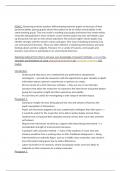ITEM C: Streaming involves teachers differentiating between pupils on the basis of their
perceived ability, placing pupils whom they believe to be of similar overall ability in the
same teaching group. This may result in working class pupils and those from certain ethnic
minorities being placed in lower streams. Lower stream pupils may lose self esteem, give
up trying and even join an anti school subculture. By contrast, higher stream pupils may
identify strongly with the school's values and goals. One way of studying streaming is to
use unstructured interviews. These are often effective in exploring interviewees’ personal
feelings about sensitive subjects. However, for a variety of reasons, some pupils and
teachers may refuse to participate in an unstructured interview.
Applying material from Item C and your own knowledge of research methods, evaluate the
strengths and limitations of using unstructured interviews to investigate streaming. (20
marks)
Introduction:
- Unstructured interviews are a method that are preferred by interpretivist
sociologists -> provide the researcher with the opportunity to gain valuable in depth
information about a person’s experiences or opinions on a topic.
- Do not consist of a strict interview schedule -> they are one or two thematic
questions that allow the researcher to respond to the interviewee and probe deeper
giving the researcher insight into their experience and validity.
- As such they are useful for investigating a wide range of sensitive topics.
Paragraph 1:
- Gaining an insight into how being placed into sets and streams influences the
pupil’s perception of themselves.
- Pupils will have been judged to be less academically intelligent than their peers ->
it would be useful for the researcher to be able to probe deeply and ask these
students how it impacted their attitudes towards school, their work ethic and their
self esteem.
- Requires the interviewer to build up a rapport with those being interviewed -> a
considerable strength of unstructured interviews.
- A problem with using this method -> many of the students in lower sets and
streams would be from a working class or Afro-Caribbean background -> being
interviewed by an authority figure, such as a middle class researcher, may result in
less information being given due to status differences.
- Labov found this in his research, where young black males were less likely to
elaborate on their responses to a white researcher.
Paragraph 2:




